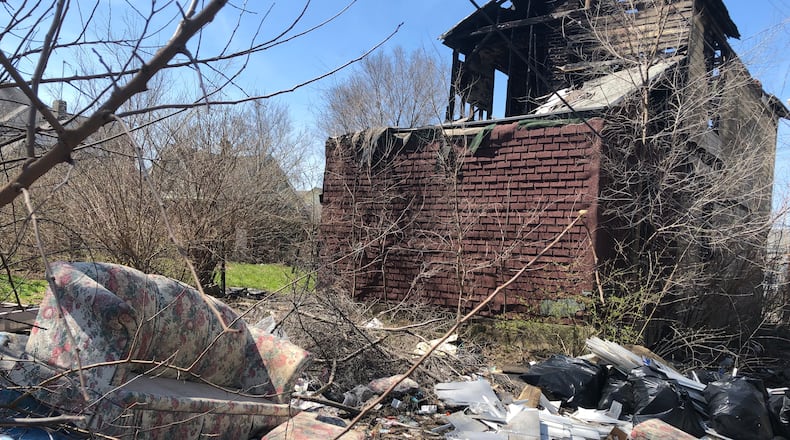Spending more than a half million dollars on illegal dumping underscores the prevalence of the problem, and it’s wasteful, city officials say. That amount of money would have been better spent filling potholes, mowing parks and making other investments that enhance neighborhoods, the city said.
“The city shouldn’t have to devote significant resources to the problem,” said Fred Stovall, Dayton’s public works director. “But a small number of people seem to believe they have the right to harm the community’s quality of life.”
In all, the city removed 3,611 tons of illegally dumped materials last year, or about 2,315 truckloads worth, which comes with personnel, equipment and disposal costs.
During the pandemic, people generated more residential waste, and authorities saw more household trash showing up at illegal dumpsites, as well as more furniture like mattresses, couches and dressers.
People spent more time at home because they worked remotely and were stuck there due to public health restrictions and other lockdown and safety measures.
The city and the Montgomery County Environmental Crimes Task Force prosecuted 13 “dumpers” last year, the city said.
The Montgomery County Environmental Crimes Task Force launched 108 illegal dumping investigations last year, an increase of 37% from 2019.
Officials largely attributed the sharp rise to a second sheriff’s deputy being assigned to illegal dumping work.
Illegally dumped waste accounted for about 6% of all trash the city collected and disposed of in 2020 (61,058 tons in total), he said.
The city collected about 4,960 tons of illegally dumped materials in 2019, and disposal costs were about $179,450, he said.
Some people are willing to disrespect and hurt the quality of life in Dayton’s neighborhoods just to try to avoid paying waste disposal fees, Stovall said.
Stovall said people can schedule free bulk waste pick-ups to properly remove a variety of materials and items that are commonly dumped, and the Montgomery Count transfer station also is an option.
Credit: Jim Witmer
Credit: Jim Witmer
The city has tried to crack down on illegal dumping by expanding its network of surveillance cameras that monitor popular dumpsites.
Authorities use cameras to try to catch offenders in the act or collect evidence that later on can help bring them to justice.
But vacant properties are popular dumpsites, and Dayton’s got an abundance of them. The city mows and maintains more than 5,000 vacant lots.
Victoria McNeal, president of the Riverdale Neighborhood Association, has complained to the city, saying illegal dumping has gotten worse in neighborhoods along North Main Street.
She said illegal dumping is deplorable, ruins neighborhood aesthetics and causes health problems and pest infestations.
She said illegal dumping makes residents feel hopeless and unattached to where they live, while also inviting crime by signaling no one cares.
McNeal and some other community activists say they think the city should routinely do bulk waste pickup at multiple areas and addresses along the North Main Street corridor that are popular dumpsites.
Illegal dumping poses health risks because it can attract vermin and insects and it can contaminate water ways and certainly costs taxpayers money, John Parker, Dayton’s waste collection manager, said during a presentation in late 2019.
Littering and illegal dumping are common sources of complaints from neighbors, and Parker said the activities lower property values and often result to additional unlawful dumping.
“Once there is a site that’s a hotspot for illegal dumping, folks continue to dump at that site over and over and over again,” he said.
Commonly dumped materials include trash, yard waste, appliances and construction debris.
Illegal dumping generally is a third-degree misdemeanor, but the improper disposal of items like tires and hazardous materials can be felony-level offenses.
The city is renewing its request that residents report illegal dumping activities by calling 937-333-4800 or visiting daytonohio.gov/reportadumper.
About the Author





